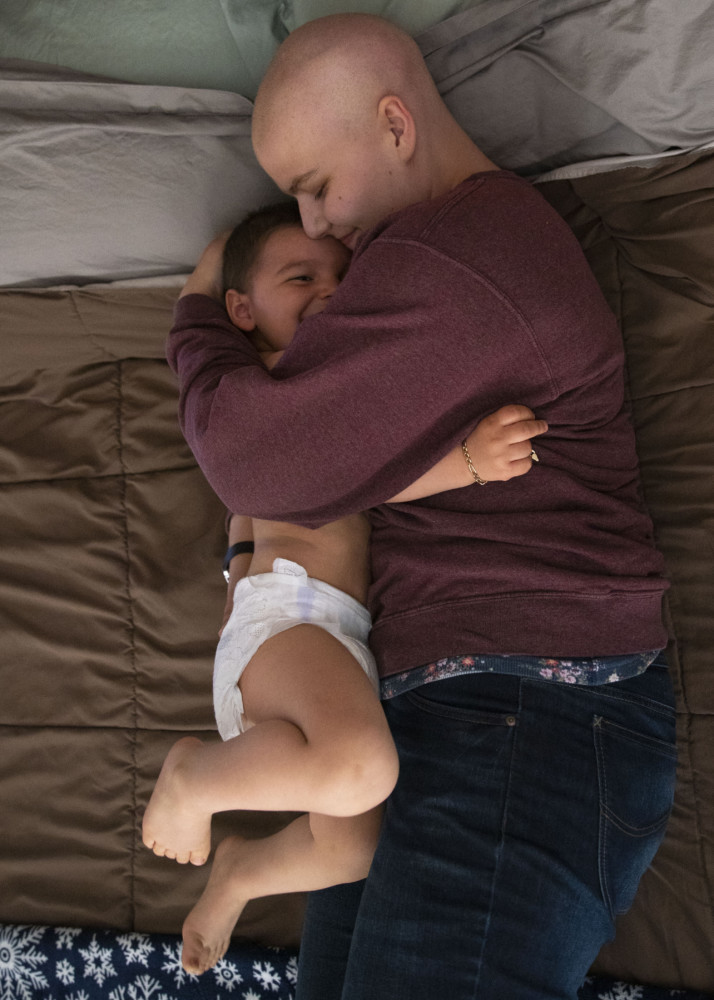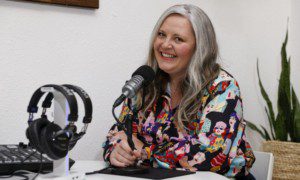By Alex Kormann
Star Tribune (Minneapolis)
WWR Article Summary (tl;dr) Taylor Bustos shares her story of strength as she battled a second cancer diagnosis under quarantine during the pandemic.
Minneapolis
Taylor Bustos rubbed her newly shaved head in the dimly lit basement of her temporary Rochester, Minn., home as an intrepid thought seized her.
“This better freaking be the last time.”
Two years ago, Bustos was happy. She was 20, recently married and had just found out she was pregnant with her first child. Taylor and her husband, Mark, 21, envisioned moving from Duluth to California and raising half a dozen kids. But those plans would have to wait.
Five months into her pregnancy, Bustos felt a lump on her neck. On Oct. 5, 2018, just a month after giving birth to her son, Solomon, she was diagnosed with nodular sclerosis classical Hodgkins lymphoma. It’s the most common type of Hodgkin’s lymphoma, a cancer that affects the body’s immune system.
“I was told, ‘This is the good cancer, it’s curable’,” Bustos said. She underwent six months of chemotherapy at St. Luke’s Radiation Oncology Associates in Duluth and was declared in remission in April 2019. After that, life went pretty much back to normal.
But last November, just before her first follow-up PET CT scan, Bustos prepared for the worst. A few weeks earlier, she had felt the lump in her neck return.
Soon later, she was back at St. Luke’s, prepared to receive whatever news may come. Mark tossed a bright pink ball to Solomon to distract the boy and himself from the mounting anxiety as they waited for what felt like an eternity in the small examination room.
The young father was also trying to manage his stress from recently learning he was being laid off from his construction job. The doctor finally stepped in.
___
“I’m sitting there with a one-year-old and my husband of two years and they’re telling me at 22 years old that I have cancer for the second time,” Bustos said.
She had gone into the meeting with the mind-set that she would never endure chemotherapy again. “It was physically and mentally unlike any other suffering I’ve ever gone through in my life … and I didn’t want to willingly say yes to going back there,” Bustos said.
After a week of thinking and praying, Bustos stumbled across a Facebook post from a friend who had recently lost his father in a house fire. His words resonated so deeply with her that she decided she couldn’t just lay down and die. “This cancer could kill me, but don’t I want my sweet son to know I tried?” she said.
Once again, she went in for treatments, then slept for three days. The big difference this time was that, to make sure the cancer never came back, she was going to have to follow the doctors’ next recommendation.
On March 2, the Bustos family picked up and moved 200 miles across the state to Rochester for three months where she would undergo some of the most toxic chemotherapy available at the Mayo Clinic. The mix was so potent that she had to first undergo a stem cell collection; those stem cells would be transplanted afterward to regrow her immune system and other healthy cells decimated by the chemo.
Mark’s layoff, which at first seemed like a disaster, was now a gift. He could assume a larger role as the family caretaker. Some people might call that luck, but the Bustos’s don’t believe in luck. For them, it was an act of God.
When it came time to move, Taylor’s parents, Pam and Jerry, who live across the street from the Bustoses in Duluth, moved with them to help take care of Solomon and Taylor.
“It really wasn’t a difficult decision,” said Jerry, who is a warehouse operator at a Duluth paper supply business.
“For me,” he said, “I would do whatever it takes to get her healthy.”
___
Their family squeezed as much as they could into their two cars, boxes stacked to the roof, rendering the rearview mirror useless. The family settled into a small house only a mile away from the Mayo Clinic.
Just over a week later, COVID-19 hit.
“We knew I’d have a weakened immune system and we’d have to quarantine,” Bustos said, “but suddenly the whole world had to quarantine, too.”
They stayed closely connected with their church through video chat and live streams. In solidarity, her entire family shaved their heads along with Bustos.
A little over a month after moving, Bustos prepared for her most difficult round of chemotherapy. All the effects of normal chemo, including nausea, exhaustion, loss of appetite and body pain would be amplified. And because of the coronavirus, she would be doing it alone. She packed her keyboard piano, a week’s worth of clothes, a few mementos from home and headed to the hospital. She would have to stay in a heavily filtered room by herself for a full week as she underwent treatment.
Masked nurses came and went as Bustos tried to picture what they looked like under all the PPE. Most days, she felt immensely lonely and sad.
Originally, she was told she’d be able to go home to see her family for one hour per day. The pandemic scrapped those plans. “I would cry … and nurses couldn’t put their hand on my shoulder to tell me, ‘It’s OK,’ because of the coronavirus,” Bustos said.
When she was finally able to return to her family a full week later, Bustos was ecstatic. “To be able to be hugged was a very welcome relief from despair,” she said.
She began to try and process what had happened to her over the last five months. She felt distant from and misunderstood by nearly everyone around her. “It can look like it’s going well from the outside but when you literally want to die, the emotional side of things needs to be handled,” she said.
Bustos has since begun therapy and is taking anti-depressants to help manage her mental pain.
As the family moved out of Rochester, the snow was gone. Birds chirped and flowers bloomed; a sign of rebirth and a new beginning.
When they pulled up in front of their apartment in Duluth, chalk drawings graced their sidewalk welcoming them home. Their front door was covered in balloons and a welcome banner was strung across the door frame, all put together by members of Bustos’s church youth group.
Bustos collapsed on her old bed. She thought she’d feel different in their own apartment, but it oddly felt the same. She had come to realize that home was no longer a physical space. Cancer changed that.
“Home for me has become Mark and Solomon,” she said, “and so whether we’re in Rochester, Duluth or Timbuktu, I’m home when I’m with them.”
___
Distributed by Tribune Content Agency, LLC.
















































































































































































































































































































































































